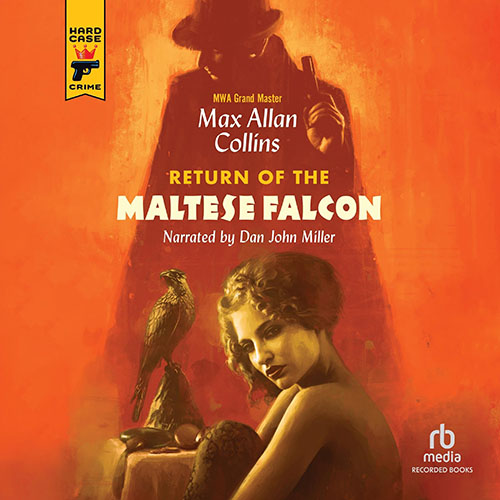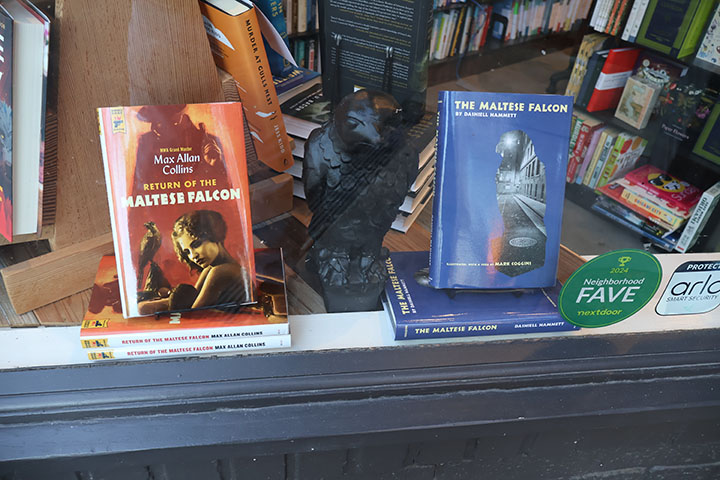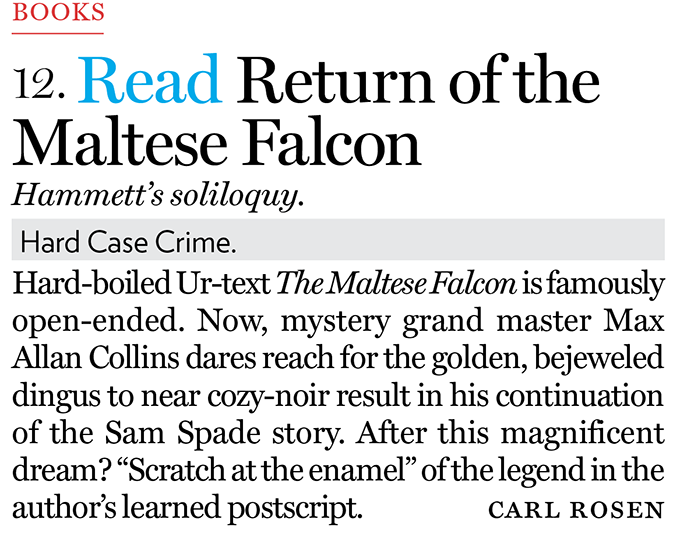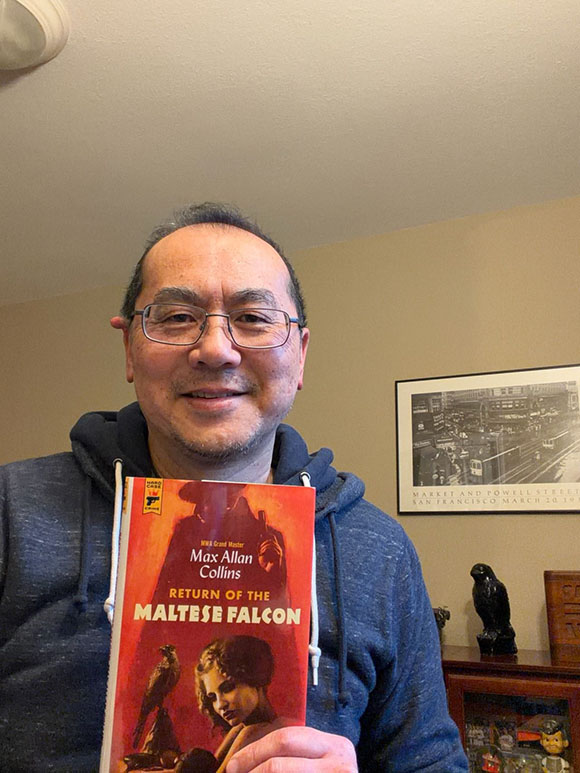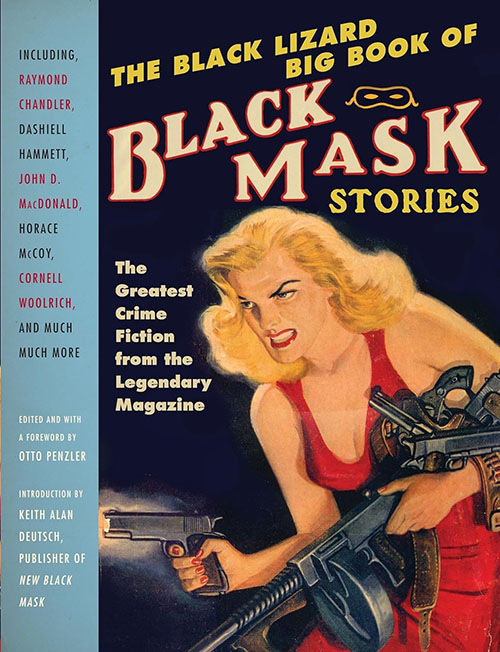The audio book of my novel Return of the Maltese Falcon is available now.
Here’s a preview of the narration by Dan John Miller:
Let’s talk about Dan John Miller for a moment. I have two narrators of choice (and I’m usually asked by the audio publisher who those narrators are). One is Stefan Rudnicki, who took over for Stacy Keach on the last batch of Mike Hammer novels, and has become the voice of Quarry.
The other is Dan John Miller, who has done quite a bit of my stuff but is most importantly the voice of Nate Heller. You can hear him as Heller most recently on The Big Bundle and Too Many Bullets.
Another narrator who is a favorite of Barb and mine, who has done the last several Antiques novels, is Gabrielle de Cuir. We’ve not been fans of previous readers, one of whom read Vivian Borne with a Southern accent (!). (Yeah, Iowa is definitely the deep South.) She has also read, with full sound effects and scores, the Fancy Anders novellas. (We’ve had a recent nibble on my completed Fancy Anders novel – I’ll let you know if/when that happens.)
Return of the Maltese Falcon seems to be doing very well, with the exception of apparently Barnes & Noble, who don’t seem to be stocking it very aggressively.
Why? (You may ask.) Barnes & Noble bases its orders by an author on what the previous author’s book’s numbers were. They seem to routinely carry my stuff, but in the mystery section with a copy or two. That we have scored three rave reviews by the three industry reviewing services (Publisher’s Weekly giving us a starred review), are doing well at Amazon, and that this is a sequel to what is widely considered the best private eye novel ever written, appears to carry no weight.
Don’t know what I can do about it, although if you are a regular shopper at a Barnes & Noble (as I am), and you don’t see the book, please inquire and make a small fuss. Small. If you want to order it from the store (a process that seems rather pointless in these online days), do so.
Also, if you are hardcore enough, snap a photo of Return of the Maltese Falcon in the wild – particularly if it’s a Barnes & Noble. I will run it here. A photo here represents what J. Kingston Pierce of the essential Rap Sheet sent along.
Meanwhile, terrific notices keep coming in.
Here’s one I’ll share with you by Craig Zablo, who knows his stuff (that dreams are made of).
First sentence…
“Samuel Spade, leaning back in his swivel-chair, studied the modest pine tree that might have sprouted tinsel-trimmed from where his late partner’s desk had till lately stood.”
The Overview: Beware of Spoilers…
THEN…
Detective Sam Spade was pulled into the search for the legendary Maltese Falcon, a jewel-encrusted gold statuette intended as a gift for the 16th century King of Spain. Spade’s partner was murdered. Spade was the prime suspect.
Brigid O’Shaughnessy who hired Spade, was willing to use money, her female charms and anything else to get Spade’s protection from criminals after the Falcon. The others were Casper Gutman, an obese gentleman malefactor and his thugs, Cairo and Wilmer Cook. Gutman depended on his brains and lies. When that didn’t work, Cairo and Cook would use their guns.
In addition to Spade’s partner, two others were killed in pursuit of the bird. Turns out Brigid was the murderess. She’s now behind bars. So is Cairo. But the story doesn’t end there…
NOW…
About a week has passed since Sam Spade’s life was upended. Rhea Gutman, the teenage daughter of Casper Gutman, wants to hire Spade to find the Maltese Falcon. Rhea informs Spade, her father was murdered, but she wants to complete his life’s mission. Rhea believes the Falcon is somewhere close. Spade accepts her retainer.
In short order, Spade is approached independently by several people who also want the Falcon.
Dixie Monahan, an infamous and dangerous Chicago gambler. He has no legal claim to the bird, but sees an opportunity to make money.
Corinne Wonderly, the younger sister of the imprisoned Brigid O’Shaughnessy wants to get and sell the Falcon. She plans to use the money raised to help her sister get a good lawyer.
Stewart Blackwood is a British Museum curator. He claims that he legally purchased the Maltese Falcon and it was stolen. Blackwood has a bill of sale.
Never one to turn down money, Spade accepts retainers from each.
Spade then works to untangle the lies, double crosses, twisted motivations and shifting alliances brought on by greed and self-preservation. Several people have already died in pursuit of the jewel-encrusted bird.
More will as well.
Recently Max Allan Collins gave away several copies of
Return of the Maltese Falcon. I was a lucky winner. Truth be told, I would have bought a copy had I not won one.Collins is an author that I follow. I’m a huge fan of Max Allan Collins’ Nate Heller series. Every new Heller tale is a must-buy for me. Collins also completed several of Mickey Spillane’s Mike Hammer novels (from partially finished manuscripts and outlines). I’ve read almost all of them. Collins’ Quarry crime novels are also good. I’ve read some of them. Same could be said for Collins’ Ms. Tree comics, his Dick Tracy strips and his movie adaptations and other novels. Max Allan Collins can be counted on to deliver a great tale each time out, but it’s his Nate Heller series that does it best for me.
Return of the Maltese Falcon shouldn’t be thought of as a sequel. It’s a continuation of the story. Taking on Hammet’s classic characters was a bold move. I’m very happy to say that Collins met the challenge.Collins is to be commended. Not only for daring to step up and continue Hammet’s classic, but also for his ease at transporting readers to 1928 San Franciso. Collins take on Spade and the other characters feels like Hammet from their motivations to dialogue. Collins’ humor (just the right amount) and witty dialogue shine. The plot twists are unexpected, but not outlandish. They work to provide a surprisingly and satisfying climax.
Return of the Maltese Falcon not only reaches the bar set by Collins’ Nate Heller novels but that of Hammet in the original tale. I don’t say this lightly.I’d love to see Collins provide us with another Sam Spade outing. Maybe even one that crosses over with Nate Heller.
Return of the Maltese Falcon gets my highest recommendation.
Rating: FIVE STARS
Here is another one:
Return of The Maltese Falcon.
Max Allan Collins.
Hard Case Crime/Titan Books.
First Edition – January 2026
“Don’t be too sure I’m as crooked as I’m supposed to be. That kind of reputation might be good business – bringing in the high-priced jobs and making it easier to deal with the enemy.” – Sam Spade in Dashiell Hammett’s The Maltese Falcon.
What ever became of the Maltese Falcon…
Closed the covers on this deeply satisfying journey back to San Francisco 1928, and to the Spade & Archer detective agency office of Sam Spade, soon after the events of Dashiell Hammett’s classic novel,
The Maltese Falcon ended.Max Allan Collins has penned a well written, researched, and respectful sequel to the search for the “dingus” as Spade calls the golden bird.
Familiar faces return; alluring femme fatales beckon, grifters, killers, and cops. The pages fly by, the chase is on, and as the plot thickens, bodies fall, the reader is pulled in, enjoying the ride, and loving it all. This is a damn fine book.
The author’s respect for Hammett and the genre is apparent on every page. As Max Allan Collins writes in the epilogue the novel is “a kind of love letter to Dashiell Hammett and the private eye form.”
Highly recommend.
I don’t talk politics here except very, very rarely. I do this because I want to respect the opinions of others and, frankly, I have no desire to alienate friends, which is how I view anybody who reads my work and comes back for more.
There is always, as Pee Wee Herman wisely said, a big but.
Last week I posted a link to an article critical of the Trump Administration. I didn’t do it here: I mean for this to be a politics free zone. But some of what’s been going on, particularly in my neighboring state of Minnesota, where some of Barb’s relatives live, makes it tough to stay silent and live with myself. The people up there are almost as nice as those in their neighboring Canada.
I got about fifty “likes” or “loves” from it, and a dozen comments, mostly favorable. A couple weren’t and one of them troubled me – not because of a political disagreement. Two things stop me from posting or responding to political stuff because (a) a few years ago I lost one of my best friends that way, and (b) nobody – NOBODY – ever won an argument on the Internet. Zero minds have been changed.
Still, I’d had enough and said so by sharing an essay by the Bulwark’s Jonathan V. Last, a writer I much admire.
Now as to the troubling comment. I am not going to reprint the writer’s name because I have no wish to embarrass or shame him, nor do I want to pick a fight. I only share this because the writer is fellow fiction writer, a thriller and private eye novelist who appears to be quite successful. I’d never heard of him but that means nothing. The only fiction writers I pay attention to are dead ones.
This is his post: “You should have continued to stay away from politics. Now you’re just another asshole. Goodbye.”
Let’s start with the last bit: I don’t recall meeting or engaging in any way with this fiction writer. Maybe I have – I’ve been to a lot of Bouchercons and Edgar Awards dinners, so, yes, I may have. If so it was friendly. I can say this because I have never had anything but friendly meetings with fellow wordsmiths at either Bouchercon or the Edgars.
Let’s go to the first sentence: he’s probably right. I should have stayed out of politics for the reasons I’ve stated above. I particularly don’t want to do it here, because that’s not what you’ve dropped by for. You (thank you for this!) are interested in what books and movies and so on I have coming out, and maybe enjoy the occasional essay I write here about pop culture.
It’s the middle sentence that troubled me.
Hey, not the first time I’ve been called an asshole. My father routinely called me a smart-ass and I seem to have survived that.
It’s the rudeness, I guess, the lack of civility that kind of stunned me. I shouldn’t have been – because people for years have gone to Facebook and its ilk to misbehave, to say things to people they wouldn’t dream of saying to their faces.
I try to imagine an instance where I would call someone an asshole in public, much less one who was a fellow toiler in the mystery game. I am not famous but I am known within the field. There are other ways to be displeased with me and my opinions then saying goodbye to someone you never said hello to, as well as call that person an asshole in an apparent attempt to, what? Embarrass them?
A lot of things are going on right now that are worth complaining about. But must we cross the line into truly hateful speech? Mickey Spillane and I did not agree on politics, but it never got in the way of the greatest friendship I ever had with a fellow writer…and I’ve had some good ones. I mean, he fucking entrusted Mike Hammer to me. We did talk politics, rarely, but it never got nasty. We were friends. Fellow Americans. Fellow humans.
Before we all start holding hands and singing “Kumbaya,” let me just say one political thing and then I’ll stop: I know Nazi shit when I see it.
I completed my draft of Antiques Web (from Barb’s excellent draft) a day ago, and tomorrow will start the final read-through and tweak. That usually takes two days.
So we are very close.
I have also confirmed that there will be a DVD of Death by Fruitcake (the Antiques movie) out in February, simultaneously with its POD release. Much more later.
Also more on the Star City Festival and the upcoming wide release of the audio drama, True Crime: The Assassination of Anton Cermak.

Our friend Dave — caught in the wild reading Quarry!
Here’s a nice write-up about the Quarry novels and the forthcoming 50th anniversary novel in the series, Quarry’s Reunion.
Both Baby, It’s Murder (the final Mike Hammer) and Antiques Round-up (the most recent Antiques novel) are on Glen Davis’ favorite books of 2025.
One of Marshall Rogers’ 13 lasting contributions to Batman is my brief collaboration with him, launching the Batman comic strip.
Thanks for listening to my non-political political rant.
M.A.C.
















